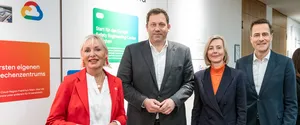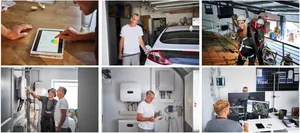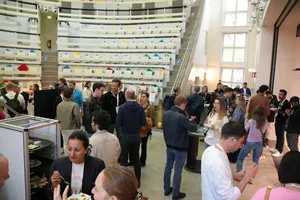Research@ bei Google in München: Tiefe Einblicke in KI, Klima, Gesundheit, Datenschutz und Quantencomputing

For an english translation of the text please scroll down.
Am 25. Juni haben wir zum ersten Mal unser neuestes Research@ Event im Münchner Google Office, Googles Entwicklungszentrum in Deutschland, ausgerichtet. Dabei standen Präsentationen und Diskussionen über einige der wegweisendsten Fortschritte in den Bereichen KI, Klima, Gesundheit, Datenschutz und Quantencomputing auf der Tagesordnung.
Dr. Wieland Holfelder, Vice President of Engineering und Site Lead von Google München, betonte das transformative Potenzial der KI und die Bedeutung der Zusammenarbeit bei der Bewältigung lokaler und globaler Herausforderungen: „Wir glauben, dass insbesondere KI ein enormes, transformatives Potenzial hat, um unser aller Leben zu verbessern. Mit Research@ wollen wir gemeinsam Lösungen für lokale Herausforderungen entwickeln, die nicht nur die Zukunft Deutschlands, sondern auch die der gesamten Welt mitgestalten können.”
Die Veranstaltung ermöglichte einen lebendigen Wissensaustausch, bei dem Google- Forscher*innen wie John Platt (Google Fellow), Mike Schaekermann, Michał Januszewski, Yurii Sushko, Federico Tombari, Mehdi S. M. Sajjadi und Tom O'Brien ihre Erfahrungen geteilt haben. Rund 150 Forscher*innen, Ingenieur*innen und Industrieexpert*innen diskutierten über wichtige Themen wie:
- Contrails: Google-Forscher*innen untersuchten innovative Möglichkeiten zur Nutzung fortschrittlicher Computertechnik und des maschinellen Lernens, um die Umweltauswirkungen von Kondensstreifen zu verringern.
- AMIE (Articulate Medical Intelligence Explorer): Teilnehmende erhielten aus erster Hand einen Einblick in ein KI-Forschungssystem, das die medizinische Diagnostik und Patientengespräche grundlegend verändert.
- Connectomics: In eindrucksvollen Präsentationen wurden die faszinierende Welt des Brain Mapping und die neuesten Techniken zum Aufspüren von Neuronen vorgestellt.
- Privacy and Machine Learning: Es wurde die Schnittstelle zwischen der Wiederverwendung öffentlicher Daten und privatem maschinellem Lernen untersucht und die Bedeutung des Datenschutzes bei der Entwicklung von KI hervorgehoben.
- Neural Representations for Real-World 3D Understanding: Die Zuhörer*innen erfuhren, wie KI von Google für Augmented Reality und andere Anwendungen zur Verbesserung unseres Verständnisses der physischen Welt genutzt wird.
- 3D Aware Scene Representation and Quantum Computing: Forscher*innen präsentierten die jüngsten Fortschritte beim Verstehen von 3D-Darstellungen und das immense Potenzial der Quanteninformatik für die Lösung komplexer Probleme, die bisher unlösbar waren.
Research@ zeigte die enorme Innovation, die hier bei uns in Deutschland und darüber hinaus zu beobachten ist. Wir setzen uns dafür ein, die technologischen Grenzen zu erweitern und mit der breiten Öffentlichkeit zusammenzuarbeiten, um echte Probleme zu lösen.
Bleibt dran, für weitere Updates zu unseren Forschungsinitiativen und zukünftigen Veranstaltungen!
English translation
Research@ Munich: Exploring the Frontiers on AI, Climate, Health, Privacy, and Quantum Computing
An inspiring gathering of cutting-edge research and collaboration
On June 25th, the Google Munich office buzzed with excitement as we hosted our latest Research@ event for the first time in Google’s engineering office in Germany. The day was filled with insightful presentations and discussions on some of the most groundbreaking advancements in AI, climate, health, privacy, and quantum computing.
Dr. Wieland Holfelder, Vice President of Engineering and Site Lead of Google Munich, highlighted the transformative potential of AI and the importance of collaboration in addressing local and global challenges: "We believe that AI especially has incredible, transformative potential that can improve all our lives. Research@ is about building solutions together to local challenges that will not only help shape the future of Germany, but also play a role in shaping our broader world."
The event fostered a vibrant atmosphere of knowledge exchange, with Google researchers including John Platt (Google Fellow), Mike Schaekermann, Michał Januszewski, Yurii Sushko, Federico Tombari, Mehdi S. M. Sajjadi, and Tom O'Brien sharing their expertise. We were also honored to have external collaborator Dariush Wahdany from Fraunhofer AISEC join us in conversation about private imbalanced transfer learning. Around 150 research scientists, engineers and industry experts discussed big themes such as:
- Contrails: Google researchers explored innovative ways to leverage advanced computing and machine learning to mitigate the environmental impact of contrails.
- AMIE (Articulate Medical Intelligence Explorer): Attendees got a firsthand look at a research AI system that's redefining diagnostic medical reasoning and patient conversations.
- Connectomics: We took a look at the fascinating world of brain mapping, and the cutting-edge techniques used to trace neurons were brought to life through engaging presentations.
- Privacy and Machine Learning: Researchers covered the intersection of public data reuse and private machine learning, highlighting the importance of privacy protection in AI development.
- Neural Representations for Real-World 3D Understanding: The audience was introduced to how Google is harnessing AI for augmented reality and other applications that enhance our understanding of the physical world.
- 3D Aware Scene Representation and Quantum Computing: Researchers showcased recent advances in 3D scene understanding and the immense potential of quantum computing for solving complex problems that were previously intractable.
Research@ Munich showcased the incredible innovation happening right here in Germany and beyond. We're committed to pushing the boundaries of technology and collaborating with the wider community to solve real-world problems.
Stay tuned for more updates on our research initiatives and future events!




